- News
- Reviews
- Bikes
- Components
- Bar tape & grips
- Bottom brackets
- Brake & gear cables
- Brake & STI levers
- Brake pads & spares
- Brakes
- Cassettes & freewheels
- Chains
- Chainsets & chainrings
- Derailleurs - front
- Derailleurs - rear
- Forks
- Gear levers & shifters
- Groupsets
- Handlebars & extensions
- Headsets
- Hubs
- Inner tubes
- Pedals
- Quick releases & skewers
- Saddles
- Seatposts
- Stems
- Wheels
- Tyres
- Tubeless valves
- Accessories
- Accessories - misc
- Computer mounts
- Bags
- Bar ends
- Bike bags & cases
- Bottle cages
- Bottles
- Cameras
- Car racks
- Child seats
- Computers
- Glasses
- GPS units
- Helmets
- Lights - front
- Lights - rear
- Lights - sets
- Locks
- Mirrors
- Mudguards
- Racks
- Pumps & CO2 inflators
- Puncture kits
- Reflectives
- Smart watches
- Stands and racks
- Trailers
- Clothing
- Health, fitness and nutrition
- Tools and workshop
- Miscellaneous
- Buyers Guides
- Features
- Forum
- Recommends
- Podcast
feature
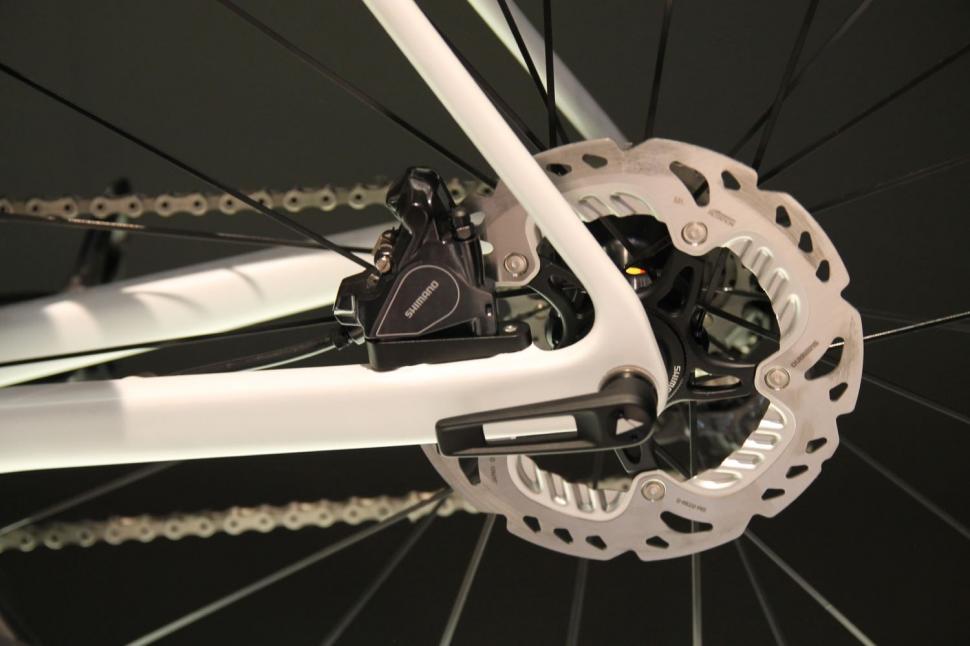 Canyon Ultimate CF SLX Disc 1
Canyon Ultimate CF SLX Disc 1Discs brakes: are we heading towards a road bike 'standard'?
Could we be making our way gradually towards a single accepted disc brake standard for road bikes, at least as far as racing is concerned?
Okay, the short answer might be: no, this is the bike world we’re talking about and nothing is ever that easy. But, that said, there is a definite trend going on right now.
At the moment the road bike world is split between 140mm and 160mm rotors and between the Shimano-designed flat mount system for attaching the brake calliper to the frame and fork – which could eventually take over completely – and the older post mount system. Then you have frames, forks and wheels that take quick release skewers and those that are thru-axle, and different axle size options…
On top of all that, you have disc brakes that are cable operated and ones that are hydraulic, and different hydraulic brakes take different kinds of fluid…
To be honest, we’re all over the place.
Check out Everything You Need To Know About Disc Brakes.
Does it matter?
In some ways it doesn’t. Life would be less complicated if we had a single standard (not an ideal word to use when covering a multitude of different designs; ‘ specification’ would probably be better, but let’s go with ‘standard’ because that’s the accepted term) for disc brakes, like it would be less complicated if we had a single standard for headsets, bottom brackets and a whole bunch of other stuff, but we’ll get by. We could file it under ‘First World Problems’.
But one area where the proliferation of designs could be a real problem, though, is in racing.
As you probably know, the UCI permitted the use of disc brakes in the pro peloton for the first time towards the end of 2015, and 2016 is serving as a season-long trial for disc brakes. Unless there are any real disasters, disc brakes will become fully sanctioned for road racing in 2017.
Team Lampre-Merida is on record as saying that it will use disc-brake equipped bikes for the Tour of Flanders (3 April) and Paris-Roubaix (10 April), and we showed you a photograph yesterday of members of the squad riding a new Merida Scultura Disc ahead of the Flanders race.
People have speculated that other teams might ride disc-equipped bikes too, several having been recently added to the UCI’s List of Approved Models of Frames and Forks.
Whether or not this happens remains to be seen. Indications are that disc brake take-up is likely to be very low, but what if disc brakes do become an integral part of the road racing scene?
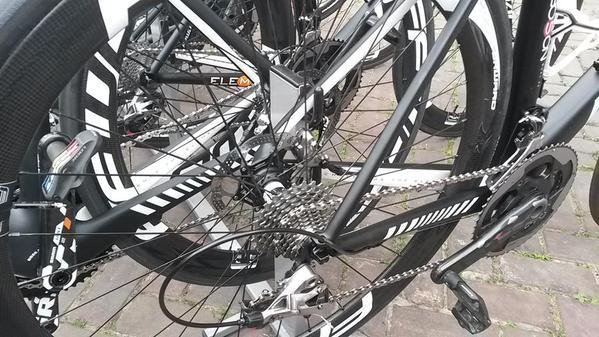
One issue is neutral race support – the guys who hand out spare wheels and bikes (and provide other services) to riders who need them during races when a team car can’t get on the scene quickly enough. How can they provide suitable wheels when everyone is on different setups?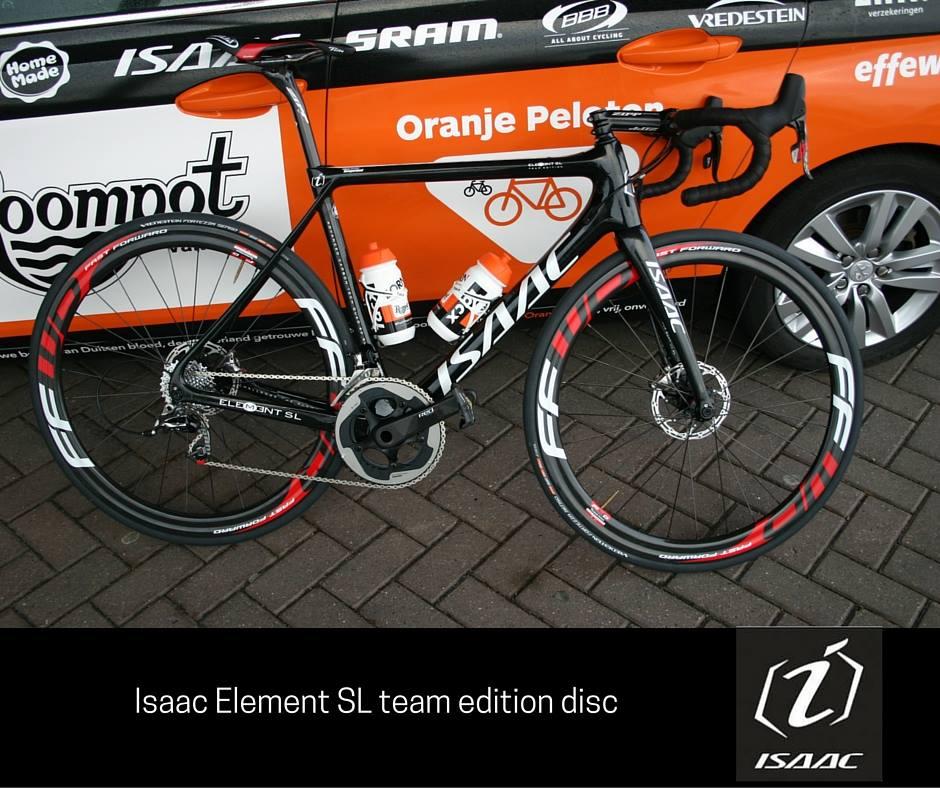
Yves Mori, the Communication and Bicycle Manager at the World Federation of the Sporting Goods Industry (WFSGI), told us that the UCI, in collaboration with the WFSGI and the five brands that provide neutral race support (Mavic, Shimano, SRAM, FSA and Vittoria), has agreed this procedure (these are direct quotes from Yves Mori):
1. There will be no fixed [disc brake] standard set which must be followed by all teams (at least not at this stage).
2. The five neutral race support providers discuss their experiences after every season and decide which standard they are going to provide in the upcoming season.
3. The neutral race support providers agreed to only provide one common agreed specification during a full racing season.
4. In the meeting in October 2015 the group agreed with the UCI to provide in the full racing season 2016, thru-axle system with 12mm diameter and 160mm rotor.
“Since this is the agreed specification, the UCI is asking the teams now to use this specification in races so that they can get the support from neutral race support,” said Yves Mori.
“It must be clear though that it is finally the decision of the team if they use this system and benefit from neutral race support or if they use another system but than cannot get support from neutral race support. It must be added here that they [a rider] can still get a full bike exchanged.”
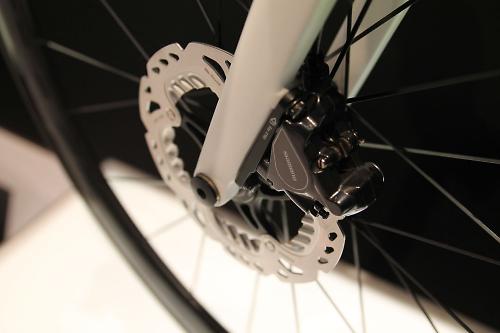
In short, the UCI is encouraging any teams that want to use disc brakes to go with 160mm rotors (front and rear) and 12mm thru-axles this season so that they can benefit from neutral race support. A decision will be made in October 2016 as to whether the neutral race support standards for 2017 will remain the same. You’d imagine there would have to be a pretty strong argument to justify making a switch after a year, teams having just got used to one setup.
We’ve also had wheel brands tell us off the record that they feel there’s a need for a standardised rotor position on the hub so any wheel will slot straight into any bike without any adjustment required.
Is this relevant to everyone else, though? Does what happens in the pro peloton affect the rest of us?
Well, it does. As well as reflecting what the manufacturers are doing, the pro peloton has an influence on the market.
First, a lot of people make their buying decisions, whether they admit it or not, on the bikes the pros ride. That’s the basis upon which sponsorship is founded. If it didn’t work, the bike brands could save themselves a helluva lot of money by not supporting pro teams.
Second, a bike brand deciding which axle type to spec, for example, is bound to be influenced to some degree by what’s accepted at the top level of the sport. If all the big guys providing neutral race support are backing one horse, it would be a brave (or foolish) punt to go for something entirely different. Why take the risk? No one wants to be the Betamax Bicycle Company.
Judging by the new bikes we’re seeing, 12mm/160mm is very much the direction in which the market is moving. We needn’t expect a complete standardisation of road bike disc brakes any time soon but maybe things are starting to become a bit clearer.
Mat has been in cycling media since 1996, on titles including BikeRadar, Total Bike, Total Mountain Bike, What Mountain Bike and Mountain Biking UK, and he has been editor of 220 Triathlon and Cycling Plus. Mat has been road.cc technical editor for over a decade, testing bikes, fettling the latest kit, and trying out the most up-to-the-minute clothing. He has won his category in Ironman UK 70.3 and finished on the podium in both marathons he has run. Mat is a Cambridge graduate who did a post-grad in magazine journalism, and he is a winner of the Cycling Media Award for Specialist Online Writer. Now over 50, he's riding road and gravel bikes most days for fun and fitness rather than training for competitions.
Latest Comments
- PRSboy 5 sec ago
Another thing ruined by the Americans
- Miller 1 hour 19 min ago
Nice to see WvA featuring in the finale.
- Miller 1 hour 21 min ago
I have known more than one elder statesman of the club die of a heart failure while out on a ride. Sometimes I feel that's about to happen to me,...
- Pub bike 1 hour 39 min ago
Via the "wireless active steering system".
- AidanR 1 hour 47 min ago
It does say "so-called reciprocol" to be fair. But I agree, Trump calling the tariffs reciprocol is disingenuous at best, given that they are based...
- Hirsute 2 hours 3 min ago
137m is the farthest I have observed when quickly looking at the Garmin unit....
- pockstone 2 hours 20 min ago
Yours worked wonders, but if you insist, I'll hop to it...why the need for extra police? Did the fire brigade bottle it?
- Jamminatrix 2 hours 34 min ago
As if Tadej Pogacar's slavery-supporting jersey is any different...
- BikingBud 6 hours 4 min ago
Do you mean this woman, who got out to marshall the truck through and is now walking back to said Wankpanzer which is blocking the road again as it...
- Pub bike 2 hours 8 min ago
He is up against the global trading system, which has obviously been in the news a lot lately. Framebuilders in other countries can undercut him,...
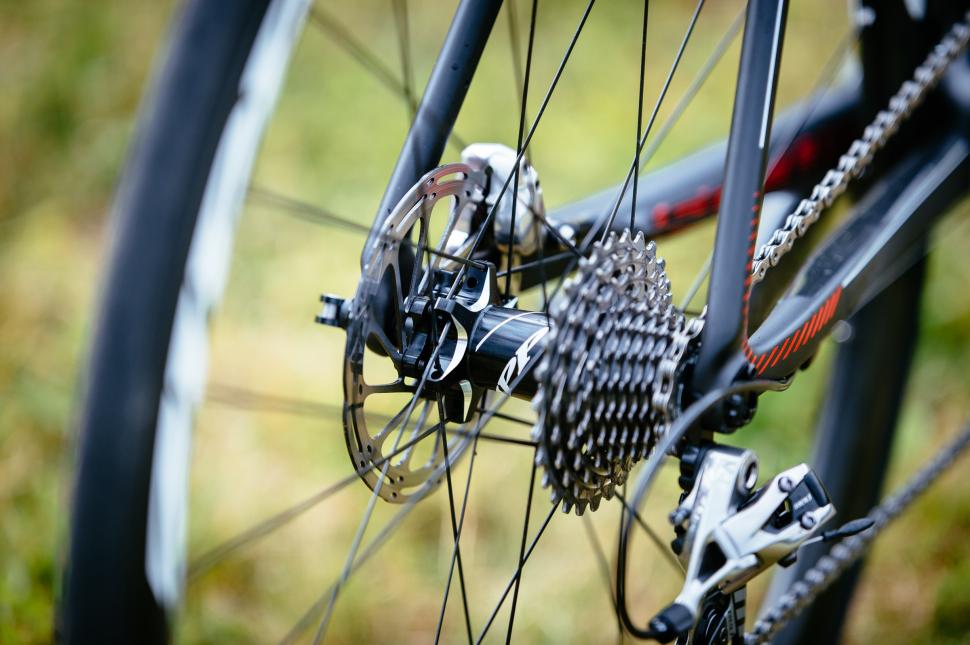
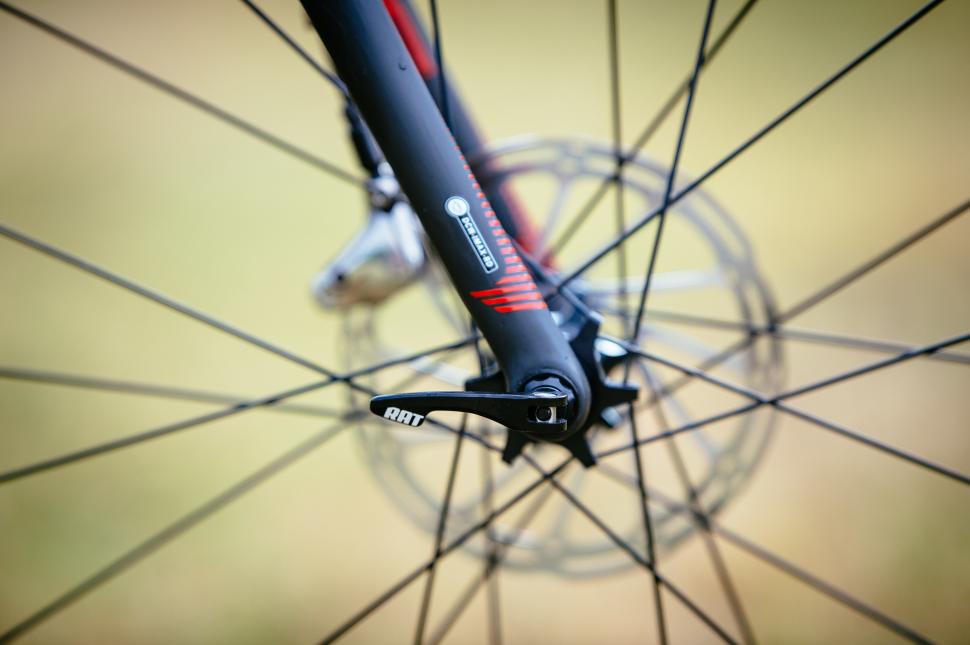

Add new comment
24 comments
Thru axles are much better than QR. Faster to put wheels on, consistent position for discs, stiffer/no rotor rub. Discs are way better for normal people, i.e. 99.9% of us.
Consistent alignment and lack of disc rub under load perhaps. Not sure what descending would have to do with any benefit of either QR or thru-axle. Speed-wise, Focus RAT thru-axles seem faster when taking off the front wheel than a QR (lawyer tabs), all thru-axles would be much slower on the rear i'd imagine but then I try and avoid spending a huge amount of my time with the bike swapping wheels around willy-nilly.. YMMV. Is it really 'an issue'.. why are people so worked up about this ?
I can't begin to understand why they even use thru axles - compared to QR they're a total PITA - and there's absolutely no need for them on a road bike (a motorbike perhaps but not a bicycle). I've been using QR for 5 years in every condition imaginable (5 descents of The Alpe in a day? 0C to 33C across those descents etc etc) and never once thought I need a TA. I now have a gravel bike with TA and I really don't see the need. It's slower to get a wheel off and on too.
I find changing the front wheel (thru axle) on my grade no problem at all, the rear wheel (QR) is more of a pain. Although I suspect this has more to do with front/rear than thru/QR. However sliding the wheel in from any angle rather than having to approach from just right to get the QR hub in could have benefits.
Also the disc/thru front wheel is easier than any other wheel I have, as there is no difficulty getting the tyre through the calipers.
Can anyone explain why we seem to have settled on 12mm for road when 15mm is the standard in MTB? I think this is just stupid.
Why not ? Not the same 'need' for a thicker axle on a road bike I wouldn't have thought (lot less drop offs etc) so smaller seems reasonable. MTB world seems to cope quite well with 20mm/15mm/12mm/10mm ThruAxle or 9/5mm QR - lots of hubs have adaptors these days to swap between the two, that seems to be the way that some of the road hubs are going too - and most people probably won't be looking at swapping between MTB and road wheels on the same frameset.. don't see the problem myself,.
SP. Your post confused me. I thought that road traffic casualties in the UK were actually decreasing. So I looked up the DfT website and found some statistics.
https://www.gov.uk/government/publications/annual-road-fatalities
I don’t have time to go looking for the very latest figures (these are up to 2013). However, from the summary.
In 2013:
1,713 people were killed in reported road traffic accidents in Great Britain, 2% (41) fewer than in 2012. This is the lowest number of fatalities since national records began in 1926. The total number of people killed in 2013 was 39% lower than the 2005-09 baseline average
The number of fatalities decreased for pedestrians, pedal cyclists and car occupants, by 5%, 8% and 2% respectively, but increased for motorcycle users by 1%. Over the same period motor vehicle traffic remained broadly stable, with a small increase of 0.4% between 2012 and 2013
With the exception of 2011, road deaths have fallen every year since 2004. Adverse weather (heavy snow falls) experienced in the first and last quarters of 2010 but not in 2011, is likely to be the main factor behind the increase in fatalities recorded in 2011
Year / Road accident fatalities
2000 3,409
2001 3,450
2002 3,431
2003 3,508
2004 3,221
2005 3,201
2006 3,175
2007 2,946
2008 2,538
2009 2,222
2010 1,850
2011 1,901
2012 1,754
2013 1,713
I have not checked but I suspect that total mileage travelled has not gone down to account for these reductions.
So my question to you is; which of the following safety features found in cars likely to be on the road in the years covered by these accident statistics has caused an overall increase in casualties due to ‘driver risk compensation’.
ABS, dynamic stability / traction control, 3 point seat belts, seat belt pre tension systems, safety glass, airbags, pedestrian ‘friendly’ crumple zones, road tyre design, isofix child seat restraints, anti burst door locking, head restraints, passenger compartment design and fittings. (I note that most of the current safety systems are about protecting car occupants in the event of a collision)
And which of these features appearing in newer vehicles are the most hazardous?
Active braking systems, auto emergency braking, collision avoidance, radar controlled cruise control / speed assistance, proximity alert (blind spot) sensors, adaptive lighting and ultimately self driving vehicles. (I note that most of these new technologies are about avoiding collisions in the first place)
Or maybe despite all these dangerous and uneccesary driver aids, the overall standard of driving in the UK is improving?
Dear people waiting until there's 'a standard'; bloody communists, the lot of ya. Choice is good.
Show me a major bike component, from a major mfr, that was widespread 30yrs ago and is now unobtainable.
<crickets chirp>...
If you are DESPERATELY CONCERNED that that 142x12 rear hub axle that you plan to keep until YOU DIE won't be available in 25 years time when it gets eaten by snakes, don't worry. There's always a burned-out bearded ex-aerospace engineer in Portland or somewhere woody that will make you one from Ti or stainless or something for maybe £50. Sorted.
Quit whining and Just Buy Discs, OK?
ps the MTB world has been living with a bunch of utterly incompatible fluids, axles and mount designs for decades. I note that no-one ever rides MTB's anymore as a result.
Hush now, didn't you hear? Campag are going to include disc brakes in their product line. It's OK to accept them as a valid method of stopping a bicycle.
Potentially greater control != dumbing it down.
Re standards, learn from the MTB world - there are a few standards (and separate out axle / wheel specs from brake specs) and mostly they all get along nicely.
Personally, I love the modulation of hydraulic disc brakes. Yes, they are can be too powerful in a club ride where some of the riders are on wet rim brakes but a bit of planning and forethought has meant my club hasn't had any issues so far (in fact we've had fewer near-misses than when some of us were on dirty rims and brake pads which weren't suitable for the conditions).
I like that we can have a choice when ignoring peer pressure.
Went for hydros on my CX and really happy with them.
Still using Ultegra 6700 'rubber pads' on my road bike and that feels solid too.
I'm not buying another road bike until the I.Std. is agreed.
I love disc brakes; the power, modulation and dependability when working correctly.
What I don't like about them is the frequency that you have to change pads due to contaniments glazing the surface.
On mtbs this happens but less so because the environment you spend most of the time doesn't usually have oil based contaniments. If anything gets in it'll be water, mud etc.
But cycling on the road is a different matter. There's all sorts of rubbish on the road surface; deisel, petrol, the residue from roadworks that'll contain some sort of hydrocarbon, etc. Mix that with water it's bound to get into the pads. You could end up changing pads a few times a month if you're unlucky or several times a year generally speaking.
had the same pads on my bb5s for a year. I commute 5 days a week and I'm using it as my long ride machine at the moment. No problems with having to change pads because of contamination.
I must be unlucky. I never used to have to change the pads on my mtb until I started using it on the road, 3 pairs in the space of a few months, total pain in the ring.
That's a fine theory you have there sir, but it simply doesn't match my experience. In a dozen years of running discs on the road I have never changed pads because of contamination. I've worn out a few, but much less often than rim blocks. Could it be that you have a leaking hydraulic system?
Thanks man.
Post mount exists to make retro-fitting mid-range MTB calipers that equal or exceed performance of "high end" road calipers awkward and ugly with adapters etc...
If after all these years there's still no single standard for rim brakes, bottom brackets, tyre choices or in fact any component of a bicycle, it seems highly unlikely that there's going to be a single standard for disc brakes. Choose your poison and accept that whatever you buy into now will be horribly old fashioned next year. Best us poor mugs can hope for is a supply of spare parts and compatible replacements for years to come.
I bet it'll take near 5 years to sort this stuff out. I wouldn't go near a disc road bike purchase-wise for 7 to 10 years cause of this.
Nothing against disc brakes per se, but my rim brakes are powerful enough and modulate sufficiently well for me. Yeah, maybe discs'd be some marginal bit better - but... I don't really care.
I see your point, but in the wet why not have the extra braking power? Equally, do you keep the same bike for 7 to 10 years?
Or I can just go more slowly?
I remember a review of a disc road bike here on road.cc a while ago, where the reviewer was raving about how the discs let you brake later and harder. So it seems like disc brakes just cause risk compensation - probably not leaving one any safer... (see also studies on introduction of ABS on taxi fleets and accident rates not changing).
That should indeed work for those times you can predict exactly when and where you need to brake. Slightly trickier downhill without dragging the brakes more, but do-able if you want to I guess.
Based on that, can you do a "Here's the top 10 bikes roundup, that support that spec" cos I would only buy a disc brake bike that supports that, from now on.